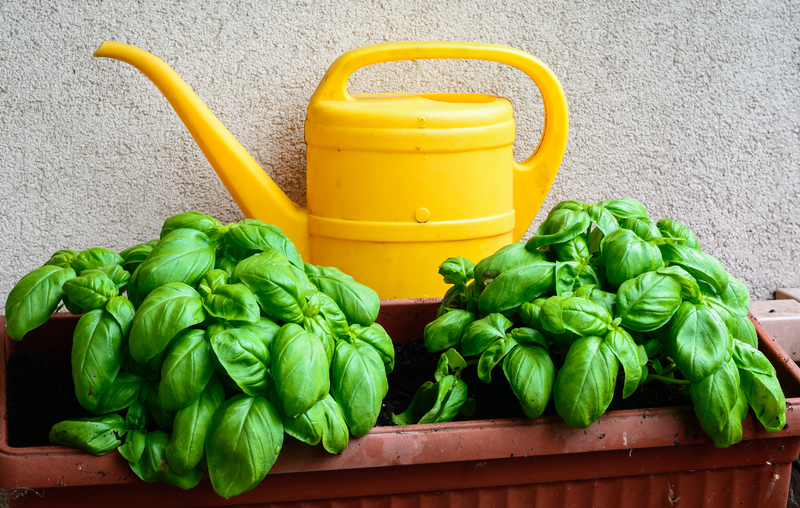Become a Weed Control Pro with These 3 Tips
Posted on 22/06/2025
Become a Weed Control Pro with These 3 Tips
Weeds - they're the relentless invaders of every gardener's paradise and the bane of beautiful lawns everywhere. If you've ever wondered how to take weed control to the next level and achieve a pristine landscape, you're in the right place. In this comprehensive guide, you'll learn not just how to manage weeds, but how to become a true weed control pro with three essential, science-backed tips. From prevention to effective eradication, we'll cover everything you need to know to maintain a healthy, weed-free garden or lawn, using eco-friendly and sustainable solutions where possible.
Understanding the Weed Problem: Why Weed Control Matters
Before diving into actionable tips, let's understand why effective weed management matters. Weeds compete with your desired plants for water, nutrients, sunlight, and space. Some weeds harbor pests or diseases, while others, like crabgrass and dandelion, can quickly overrun your lawn or flowerbeds. Left unchecked, weeds will diminish the appearance of your landscape and reduce yields in vegetable patches and agricultural fields alike.
That's why developing pro-level weed removal strategies, and mastering a few key weed control techniques, are vital for anyone seeking a beautiful and productive outdoor space.

Tip 1: Embrace Preventative Weed Control Tactics
Prevention is always better than cure, especially when it comes to weed control. By creating conditions unfavorable for weeds, you'll dramatically reduce future weeding efforts. Here's how:
Mulching - Nature's Weed Barrier
- Organic mulch (like wood chips, bark, straw, or compost) not only inhibits weed growth by blocking sunlight but also improves soil health as it decomposes.
- Synthetic mulches (such as landscape fabric or plastic sheeting) offer immediate weed suppression for garden beds, though they may need to be replaced every few seasons.
- For best results, apply a layer of mulch that's 2-4 inches deep around plants and in empty spaces. Avoid piling mulch directly against stems or tree trunks, as this can cause rot.
Healthy Lawns Crowd Out Weeds
- Set your mower high. A taller mow (generally 2-4 inches depending on grass type) encourages thick, healthy turf that shades out emerging weeds.
- Follow core lawn care practices: fertilize appropriately, water deeply but infrequently, and aerate compacted soil.
- Choose high-quality grass seed varieties suited to your climate and soil conditions, as vigorous lawns outcompete weeds for resources.
By making your garden or lawn less hospitable to weeds from the start, you'll save countless hours on hands-and-knees maintenance--one of the secrets of weed control professionals.
Tip 2: Master Weed Identification and Timely Removal
Not all weeds are alike! Some common nuisances include annuals (like chickweed), perennials (such as dandelions), and tough invasive species (like bindweed or Japanese knotweed). The key to efficient weed eradication is identifying them early and removing them before they spread or set seed.
Why Weed Identification Matters
- Certain weeds require specific removal techniques. For example, deep-rooted perennials may need to be dug out completely, while shallow-rooted annuals can be uprooted by hand or with a hoe.
- Some species propagate by seed, others by runners or rhizomes. Knowing the difference helps you tailor your control methods and prevent regrowth.
Timely Weeding Is Crucial
- Always remove weeds before they flower or go to seed. A single dandelion can produce hundreds of windborne seeds!
- After rainfall, soil is softer, making it easier to pull weeds out--roots and all.
- For large infestations, use a combination of hand-pulling, hoeing, and spot-spraying with eco-friendly herbicides where necessary.
Pro Tip: Carry a weeding tool with you during garden walks. Pulling a few weeds each time makes the task less intimidating and prevents weeds from becoming overwhelming.
Tip 3: Choose the Right Weed Control Method for Each Situation
The best weed control strategies are situation-dependent. Sometimes manual removal is effective, while in other scenarios, organic or chemical controls are needed for lasting results. Here's how to pick the right tool for the job:
Manual & Mechanical Weed Control
- Hand-pulling: Ideal for small gardens, raised beds, and when weeds are young. Hold the plant at the base, and pull steadily to remove the whole root system.
- Hoeing and cultivating: Hoe annual weeds at the soil surface on a dry day, so they shrivel in the sun. Avoid disturbing roots of your desired plants.
- Weed torches: For patios or cracks in driveways, use a flame weeder (carefully) to scorch weeds.
Organic and Natural Weed Killers
- Vinegar, salt, and soap solutions: These household ingredients can be mixed to create a non-selective herbicide, effective in driveways or sidewalks but not recommended for garden beds (they may harm soil and beneficial plants).
- Corn gluten meal: Acts as a pre-emergent weed suppressant for lawns. Apply in early spring for best results.
Selective and Non-Selective Chemical Weed Control
- Selective herbicides: Target broadleaf weeds without damaging most grasses--perfect for lawns invaded by dandelions, clover, or plantain.
- Non-selective herbicides: These kill virtually any vegetation (including grass). Use them with caution, and only for eradicating weeds in non-planting areas or in preparation for new beds.
Important: Always follow product labels and environmental guidelines to ensure you're using herbicides safely and responsibly.
Bonus Expert Advice: Integrated Weed Management for Pros
If you want to truly level up and maximize your weed control success, adopt Integrated Weed Management (IWM) - a modern, holistic approach that combines multiple methods and adapts to the unique conditions of your landscape.
Elements of Integrated Weed Management
- Cultural controls: Crop rotation, mulching, companion planting, and soil improvement to favor your desired species.
- Mechanical controls: Mowing, tilling, and targeted cultivation.
- Biological controls: Utilizing natural weed-suppressors like groundcovers, or even employing grazing animals in large areas.
- Chemical controls: As a last resort, used carefully and as part of a larger management plan.
By rotating multiple strategies throughout the growing season, you'll reduce the risk of weeds developing resistance to any one method - an essential aspect of long-term weed suppression.
Common Weed Control Mistakes to Avoid
- Letting weeds go to seed: Always remove weeds before they set seed to avoid an ongoing cycle of reinfestation.
- Improper herbicide application: Using the wrong product or spraying on windy days risks harming your garden or the environment.
- Skipping soil health: Poor soil invites weeds. Amend your soil and maintain thick, healthy plantings for natural weed competition.
- Neglecting edges and borders: These are weed entry points--mulch, mow, or edge regularly to keep invasions at bay.
Why Becoming a Weed Control Expert Pays Off
Taking the time to master weed control offers a wealth of advantages. You'll enjoy:
- Time and labor savings as weeds become less prevalent over time.
- Healthier, more resilient lawns and gardens that look great year-round.
- Reduced reliance on harsh chemicals through better prevention and natural controls.
- Better yields if you grow vegetables or fruit, as your crops won't face competition from pesky weeds.

Become a Weed Control Pro: Key Takeaways
- Prevention is your first line of defense: Mulch, proper mowing, and healthy soil are the cornerstones of weed-free landscapes.
- Know your enemy: Learning to identify and remove weeds early keeps them from multiplying.
- Adapt your weed control methods: Use the right technique--manual, organic, or chemical--for each situation.
- Integrated strategies work best: Combine multiple weed control techniques for lasting results.
Conclusion
By applying these three expert tips--preventing weeds, acting quickly and knowledgeably, and choosing the best control methods--you can elevate your weed control skills to professional status. With diligence, practice, and a little know-how, anyone can maintain a gorgeous, weed-free lawn or garden while minimizing environmental impact.
Ready to become a weed control pro? Start today, and transform your yard into the lush, inviting oasis you've always wanted!
Frequently Asked Questions About Weed Control
Can I completely eliminate weeds forever? It's unlikely, as weeds are persistent and opportunistic. However, consistent management using these tips can keep weed populations minimal and manageable all season long.
Are there safe alternatives to chemical weed killers? Yes! Manual weeding, mulching, and organic sprays such as vinegar are great alternatives, especially around edible plants and in play areas.
How often should I weed my garden? The answer depends on your location and garden conditions, but weekly checks--especially during early spring and after rain--are highly effective for staying on top of the weed problem.
Is it possible to be eco-friendly and still have a weed-free garden? Absolutely. Combining natural weed control methods with good garden management can dramatically reduce your reliance on synthetic herbicides while keeping your landscape beautiful.
With these expert weed control tips, persistence, and care, you truly can become a weed control pro--naturally!
Latest Posts
Merging Style and Function in Your Garden Seating Setup
Bountiful Backyards: Gardening as a Climate Solution
Harness Nature's Speed with 9 Fast-Progressing Privacy Hedges

